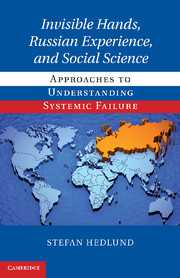 Invisible Hands, Russian Experience, and Social Science
Invisible Hands, Russian Experience, and Social Science Book contents
- Frontmatter
- Contents
- Preface
- Introduction
- 1 Opportunity and Self-Interest
- 2 Scope and Tradition of Social Science
- 3 Markets under Central Planning
- 4 Russia's Historical Legacy
- 5 Markets Everywhere
- 6 Institutional Choice
- 7 History Matters
- 8 Concluding Discussion
- 9 Implications for Social Science
- Bibliography
- Index
Introduction
Published online by Cambridge University Press: 01 June 2011
- Frontmatter
- Contents
- Preface
- Introduction
- 1 Opportunity and Self-Interest
- 2 Scope and Tradition of Social Science
- 3 Markets under Central Planning
- 4 Russia's Historical Legacy
- 5 Markets Everywhere
- 6 Institutional Choice
- 7 History Matters
- 8 Concluding Discussion
- 9 Implications for Social Science
- Bibliography
- Index
Summary
The sudden onset of the global financial crisis triggered a whole series of shock waves that rippled through the global economy, causing major social and political dislocations along the way. As the media began fielding sweeping accusations of inherent corporate greed, as the root of the evil, financial district streets in New York and elsewhere filled with violent protesters demanding retribution. In consequence, corporate jets were grounded and corporate executives could be seen using high-occupancy vehicle (HOV) lanes when traveling to the U.S. Congress with pleas for taxpayer bailouts. At the height of the storm, financial market operators even elected to dress down in public, for fear of personal reprisals.
Driven by justifiable wrath from the side of those who lost not only jobs but in many cases also homes and life savings, politicians responded with shows of great resolve in hunting down the culprits. A prominent but far from isolated example was the Republican senator John McCain, who used a September 2008 presidential campaign rally to vow that if elected he would “put an end to the reckless conduct, corruption, and unbridled greed that have caused a crisis on Wall Street.” Sensing how the winds were blowing, others followed suit.
As such, there was nothing really strange in any of this. The collapse of major multinational corporations, some of which had been widely admired for their prowess, was followed by revelations of lavish bonus schemes and of self-serving corporate behavior that seemed to defeat even the wildest of fantasies.
- Type
- Chapter
- Information
- Invisible Hands, Russian Experience, and Social ScienceApproaches to Understanding Systemic Failure, pp. 1 - 22Publisher: Cambridge University PressPrint publication year: 2011


